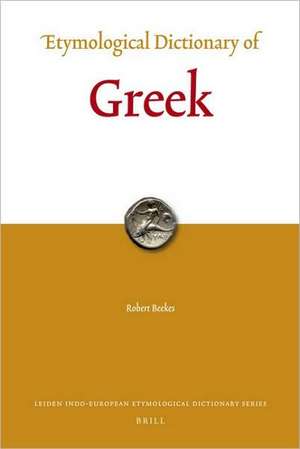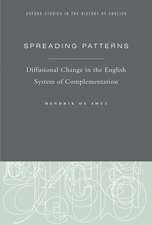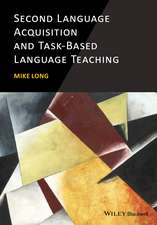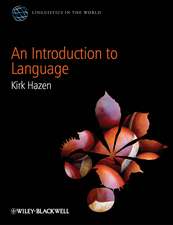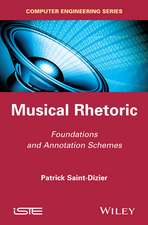Etymological Dictionary of Greek (2 vols.): Leiden Indo-European Etymological Dictionary Series, cartea 10
Autor Robert Beekesen Limba Engleză Hardback – 25 oct 2009
- More than 8000 entries
- Each lemma gives clear information about origin and reconstruction, the first date of attestation, and all relevant variant forms
- Extensive bibliography and exhaustive references for each lemma
- Rich source of information on Greek and its relation to other Indo-European languages
Preț: 2739.45 lei
Preț vechi: 3340.80 lei
-18% Nou
Puncte Express: 4109
Preț estimativ în valută:
524.21€ • 560.54$ • 437.06£
524.21€ • 560.54$ • 437.06£
Carte indisponibilă temporar
Doresc să fiu notificat când acest titlu va fi disponibil:
Se trimite...
Preluare comenzi: 021 569.72.76
Specificații
ISBN-13: 9789004174184
ISBN-10: 9004174184
Pagini: 2000
Dimensiuni: 160 x 240 x 104 mm
Greutate: 3.24 kg
Editura: Brill
Colecția Brill
Seria Leiden Indo-European Etymological Dictionary Series
ISBN-10: 9004174184
Pagini: 2000
Dimensiuni: 160 x 240 x 104 mm
Greutate: 3.24 kg
Editura: Brill
Colecția Brill
Seria Leiden Indo-European Etymological Dictionary Series
Notă biografică
Robert S. P. Beekes (Ph.D. 1969) is Professor emeritus of Comparative Indo- European Linguistics at Leiden University. He has published extensively on the historical grammar of Greek, Iranian and Indo-European, including The Development of the Proto-Indo-European Laryngeals in Greek (Mouton, 1969), The Origins of the Indo-European Nominal Inflection (IBS, 1985), A Grammar of Gatha-Avestan (Brill, 1988), and Comparative Indo-European Linguistics: An Introduction (Benjamins, 1995).
Descriere
A must-have research tool that should be on every classicist’s desk.
The first comprehensive etymological dictionary of Greek in the English language
Greek is among the most intensely and widely studied languages known. Since the publication of the last etymological dictionary of Greek, both the reconstruction of Proto-Indo-European, and our knowledge of the Greek substrate have led to numerous, often surprising new insights into the history and formation of the Greek vocabulary.
This dictionary is a treasure trove covering 2000 years of Ancient Greek: from Mycenaean via Homer and the classical period to lexicographers, such as Hesychius (5th century A.D.).
It consists of 7500 entries with thoroughly revised etymologies. Each entry gives clear information about the origin of the Greek word and its first date of attestation. It further provides all etymologically relevant variants, dialectal forms, derivatives, compounds, and bibliographical references.
This dictionary is a truly indispensable tool for those in search of a deeper knowledge of the Greek vocabulary, its history and, therewith, a better understanding of the language.
The first comprehensive etymological dictionary of Greek in the English language
Greek is among the most intensely and widely studied languages known. Since the publication of the last etymological dictionary of Greek, both the reconstruction of Proto-Indo-European, and our knowledge of the Greek substrate have led to numerous, often surprising new insights into the history and formation of the Greek vocabulary.
This dictionary is a treasure trove covering 2000 years of Ancient Greek: from Mycenaean via Homer and the classical period to lexicographers, such as Hesychius (5th century A.D.).
It consists of 7500 entries with thoroughly revised etymologies. Each entry gives clear information about the origin of the Greek word and its first date of attestation. It further provides all etymologically relevant variants, dialectal forms, derivatives, compounds, and bibliographical references.
This dictionary is a truly indispensable tool for those in search of a deeper knowledge of the Greek vocabulary, its history and, therewith, a better understanding of the language.
Recenzii
A must-have research tool that should be on every classicist’s desk.
Greek is among the most intensely and widely studied languages known. Since the publication of the last etymological dictionary of Greek, both the reconstruction of Proto-Indo-European, and our knowledge of the Greek substrate have led to numerous, often surprising new insights into the history and formation of the Greek vocabulary.
This dictionary is a treasure trove covering 2000 years of Ancient Greek: from Mycenaean via Homer and the classical period to lexicographers, such as Hesychius (5th century A.D.).
It consists of 7500 entries with thoroughly revised etymologies. Each entry gives clear information about the origin of the Greek word and its first date of attestation. It further provides all etymologically relevant variants, dialectal forms, derivatives, compounds, and bibliographical references.
This dictionary is a truly indispensable tool for those in search of a deeper knowledge of the Greek vocabulary, its history and, therewith, a better understanding of the language.
Greek is among the most intensely and widely studied languages known. Since the publication of the last etymological dictionary of Greek, both the reconstruction of Proto-Indo-European, and our knowledge of the Greek substrate have led to numerous, often surprising new insights into the history and formation of the Greek vocabulary.
This dictionary is a treasure trove covering 2000 years of Ancient Greek: from Mycenaean via Homer and the classical period to lexicographers, such as Hesychius (5th century A.D.).
It consists of 7500 entries with thoroughly revised etymologies. Each entry gives clear information about the origin of the Greek word and its first date of attestation. It further provides all etymologically relevant variants, dialectal forms, derivatives, compounds, and bibliographical references.
This dictionary is a truly indispensable tool for those in search of a deeper knowledge of the Greek vocabulary, its history and, therewith, a better understanding of the language.
